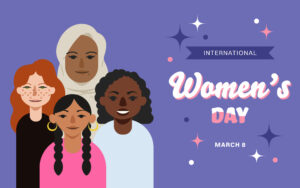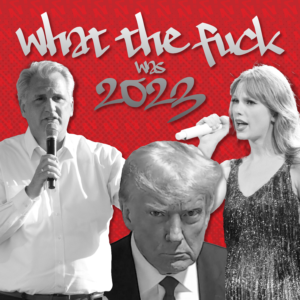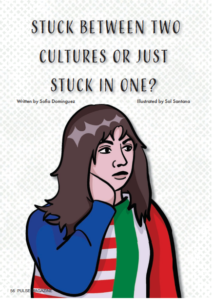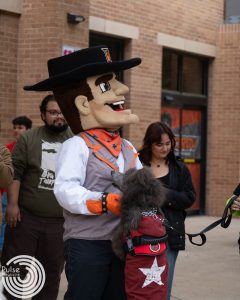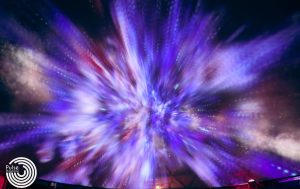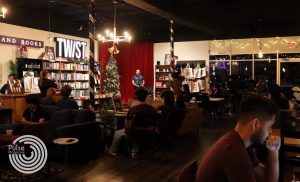Q&A with Podcast Hosts Kaszyca and Sarah Costello
In their weekly podcast, “Sounds Fake but Okay,” Kayla Kaszyca and Sarah Costello discuss relationships, sexuality and identity through an asexual and aromantic lense. Kaszyca identifies as demisexual, a label on the asexual spectrum, and Costello identifies as asexual and aromantic. In case you are unfamiliar with ace terms, here are definitions of some labels that Kaszyea and Costello used in the Q&A. For longer explanations of the main labels, check out “All About Asexuality” on Pulse.
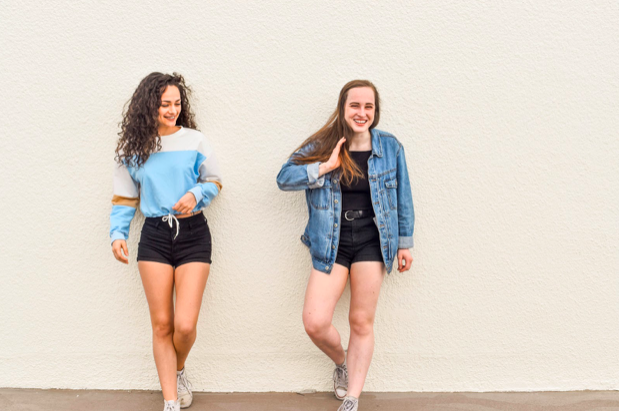
- Asexual: a person who is not sexually attracted to any gender. A short form of this is ace.
- Aromantic: also called aro, this is a person who does not feel romantic attraction to any gender.
- Demisexual: a person who only feels sexual attraction to another person after an emotional bond has been established. The short form of this is demi.
- Aspec: ashortened name for people on the asexual and aromantic spectrum.
- Grayromantic: a person who feels romantic attraction to a lesser extent and/or less often than what is considered “normal.”
- Quoiromantic/WTFromantic: a person who cannot distinguish between romantic and platonic attraction.
- Was there ever a denial or second questioning phase that you went through? If so, please describe. How do you think this experience is different for aro/ace people?
Kaszyca: I absolutely had denial when I first started realizing I was demisexual. For a long time I knew deep down, I was demi. But I was very open about the fact that I wasn’t comfortable taking the label. I would talk about demi experiences but actually calling myself demi just seemed so final, which scared me. I think the hard thing about realizing and questioning that you’re aro/ace is it’s harder to have concrete proof in a way. If you’re a gay man, you can very clearly tell and act on being attracted to other men. As an aro/ace person, it’s not as easy.
Costello: As a child of the internet, I was familiar with asexualiy long before I ever started questioning. But until I got to college, I just kind of assumed I was a “late bloomer.” However, there was a brief time (very brief, think one day) when I was in high school —probably 15 or 16— where I had a moment of thinking, “Am I demisexual?” But I was so afraid to voice it that I wasn’t even brave enough to put it deep in the tags of a Tumblr post (I’m pretty sure I actually put it in my drafts and then deleted it), and ultimately I said, “That’s silly. I’m not demi,” and went on my merry little way. By the time I started questioning in earnest, I was able to look back at that one day and think, hmm, maybe she was actually onto something.
Like Kayla said, the hardest part about questioning as an aspec is the lack of concrete evidence. For my gay sister, she was able to look at a woman and say, “Oh, I think I’m interested in that. I’m probably queer.” But for me as an aro ace person, the evidence that I had of my queerness was a lack of evidence of anything else. In hindsight, it might be clear, but when you’re in it, it’s hard to identify an orientation that is defined as being the lack of something. If you’ve never had a crush on someone, is it because you’re aspec, or are you just surrounded by no one crushworthy? If you’re not interested in dating as a high schooler, is it because you’re aspec, or is it because you’re just busy and not trying to get into a relationship with a kid who wears too much Axe body spray?
- What situation or moment started the questioning? Was it upon learning the terms or before or after that?
Kaszyca: I only started questioning after I learned about asexuality and other terms like demisexuality. If Sarah had not come out as asexual and taught me about the community, I don’t think I would have ever started questioning or figured out my identity.
Costello: For me it was the thought that, “Well, if I’m really a late bloomer, wouldn’t it have happened by now?” I was 18, in college, and had never had so much as an urge to kiss or date anyone. Ever. At that point, I returned to the concept of asexuality, which was a term that had just been biding its time in the back of my head, and started to really research what it all meant.
- For people who are struggling with their identity, how were you able to make the decision to adopt an aro or ace label?
Kaszyca: Like I said, it can be hard to find concrete “proof” of being aro or ace, since it is defined by the absence of something. But for me I was able to finally feel comfortable taking the label when I got as much “proof” as I was able to. I was casually dating a guy and was just so anxious about the idea of having sex with him because I wasn’t attracted to him in that way. My anxiety around that relationship and situation and my inability to comfortably keep a casual relationship really pushed me to finally accept myself.
Costello: For me, the ace of it all was easy, but the aro less so. I waffled about terms for a while, thinking I was maybe grayromantic or quoiromantic/WTFromantic, but those never felt quite right. Reminding myself that I could always change my mind, I decided to just try aromantic on for size one day by throwing it in my Tumblr bio, and — well, I never did change my mind.
- How has discovering your sexuality affected you? That is, how did having a label impact your understanding of yourself and others? Did the knowledge of your label change the way you interacted with people? For example, I was diagnosed with autism, which changed not only the way that I view my social interactions but also how I view my ace-ness.
Kaszyca: Coming out and joining the aro/ace community has absolutely impacted my worldview. Aspec people have such a specific way of viewing the world because asexuality and aromanticism are so divergent from the norm and from what society wants. It has really allowed me to open my mind to new possibilities in all areas of my life.
Costello: My being aspec has helped me realize that literally everything in this world is made up. So-called “rules” about relationships or how a person ought to experience attraction, expectations for gender expression, our understanding of what “normal” means — none of it is set in stone. Personally, I find that to be incredibly freeing, and I try hard to not impose those expectations onto the people around me.
- For someone who may feel overwhelmed by all of the labels, what advice would you give to someone who really wants to get everything cleared up as opposed to someone who is all-right with just being aro/ace or queer without being more specific?
Kaszyca: The large number of micro labels in the aspec community is one of the most daunting but amazing things about being aspec. On one hand, it’s amazing to be able to put a word or label to a very specific experience. On the other, it creates a large learning curve and can be overwhelming to people who are questioning. I would suggest spending a lot of time on online resources and connecting with other aspec people. The more you’re able to recognize labels and pair them with experiences, the more they’ll start to make sense. If you want to get specific with your labels rather than just saying aro or ace, then try a few labels on and see how they feel! It’s okay to change up your labels if you don’t think they fit in the end.
Costello: It’s not a race. I know that can be frustrating to hear, especially if you’re the type of person who just wants answers, but there is no timeline for questioning, and there are no requirements for how it ought to turn out. As annoying as it may be to say, “I know I’m queer/aspec, but I don’t how exactly how,” sometimes it’s just about learning to sit with that and be okay with it. Maybe you’ll figure it out someday. Maybe you won’t. It’s all okay.
- Are there any misconceptions about aro/ace-ness that you find keeps people from adopting the label?
Kaszyca: Recently I have seen some people hesitant to take the label because they don’t see themselves as very represented in the community. They worry that if they are in a long term relationship or if they enjoy sex then they can’t be aspec. This couldn’t be further from the truth. There are so many aspec people with so many different experiences. Again, it all comes down to attraction, not your actions.
Costello: This isn’t exactly a misconception, but I think people struggle with adopting the label because of fear. Not a fear of being out or anything, but just fear that if they acknowledge that they are aspec, they are acknowledging that there is something wrong with them, or at least something lacking in them. This is, of course, rooted in overwhelming social allonormativity, but just putting it on the record once and for all: there is nothing wrong with you. By definition, your identity may mean you are “lacking” something —attraction— but there is also so much to be gained from being aspec. Being aspec opens the door to a sense of freedom from expectations, and although anyone, including allos, can look through our aspec lens and see a whole new world of how to be, no one experiences it quite like us. Personally, that’s a trade-off I would make every time.
For more information on asexuality, check out the following resources:

